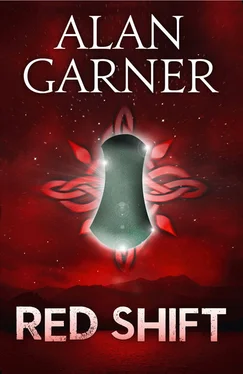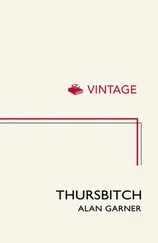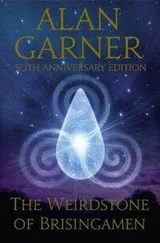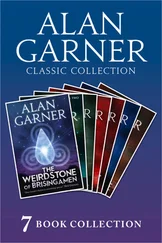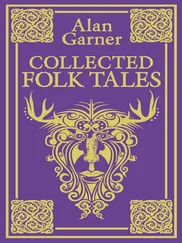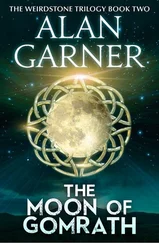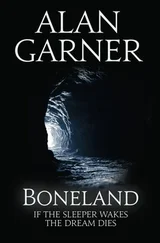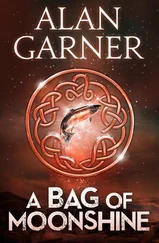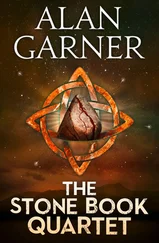“Precisely.”
“How can they stay sane, doing that work?”
“They never let themselves be involved. It’s in the training.”
“But they’re always on call, especially with that thing.”
“What, the Tam? There are some patients who’d rather talk to a phone than to Mum or Dad.”
“Get away.”
“They would. They feel safer. A tape recorder doesn’t want things from them.”
“A cassette confessor.”
“If you like.”
“An automatic answering divine. God in the machine.”
“Don’t be daft,” said Jan. “It’s only something that helps two people help a lot of others. It means they’re never out of touch.
“Or never in.”
“They’re busy.” She switched the tape on and spoke into the telephone. “This is Jan. I’m going to the caravan for tea, then Tom’s coming back to work.”
“Do you ever meet?” said Tom.
“I didn’t ask for that.”
“Sorry.”
“OK. But it wasn’t funny.”
“No.”
They sat by the fire; landscapes were in the coals.
“Are you sulking?” said Jan.
“Thinking.”
“What?”
“Plans.”
“Secret?”
“No.” Tom fingered the stonework of the hearth. “I’ll miss this nonentity box.”
“I shan’t,” said Jan. “All our houses are bland, wherever we go. Dad has to buy and sell quickly.”
“It’s better than a caravan. It gives you room. Every way. Plenty of space for ducks on these walls.”
“You’re a snob.”
“Inverted,” said Tom. “I made my father a regimental gnome when I was ten: spent weeks of Free Expression on it at school.”
“What happened?”
“It melted in the rain. But he was chuffed at the time.”
“Will you be able to work in the caravan?”
“Not as well as I can here, but I’ll manage. Anybody can pass exams.”
“You’re spooking me. You’re too quiet.”
He put his head on the stone. “I’m not very quiet inside. Come on. Let’s go. Forget the house. It’s only a waiting room now.”
The men had stopped their hammering.
It was dark in the birch wood among the caravans. People moved along the cinder roads, carrying buckets. On every screen, the same wrestler bounced off the same ropes into the same forearm smash.
“It was recorded last week,” said Tom.
They reached Tom’s caravan. His father’s topiary, privet grown in ammunition boxes, stood along the front, the rope handles stiff with white gloss paint.
Tom and Jan kicked off their shoes as they entered. Now the crowd could be heard, and the bell for the fifth round.
“Leave your boots in the vestibule.” Tom’s mother called from the lounge.
“Have done. What’s the score?”
“One each. A folding press and a back-breaker submission.”
“I’ve worked it out,” he said to Jan. “We’ll be all right. Tell you later.”
They went into the kitchen. His father had laid the table, and was tossing lettuce in a dressing.
“Smells good,” said Jan. “What is it?”
“Wine vinegar and dill.”
“I always drop the salad on the floor,” said Jan.
“The secret’s in the bowl. Use one a lot bigger than you think you need: give yourself plenty of room.”
“I estimate that salad has proportionately more space allocated to it than I have,” said Tom. “Permission to be a lettuce, sir, please.”
“Permission refused,” said his father.
“Carry on, sergeant-major,” said Tom, and went to lie on his bunk.
Through the partition wall he could hear the television commentary, and a few feet away Jan and his father were discussing salad. “Boston Crab and Cold Lobster do not mix,” he wrote in his Physics notebook.
He took from behind the pillow a pair of army headphones which he had padded with rubber. He clipped the cans over his head, and was private again. Jan and his father made the rest of the salad, and he watched them as if they were in an aquarium. On the caravan wall, framed, were his great-grandfather’s war medals, and beneath them his grandfather’s. His father’s uniform hung, ready for duty, the one ribbon, for Long Service and Good Conduct, clean, new, crimson and silver.
He felt his mother pass by from the lounge and saw her go into the kitchen to fry herself some bacon. The smell came through the silence. Then Jan was with him, smiling, reaching out her hand. He took off the cans and entered the aquarium.
“Single-leg Boston in the last round,” his mother said. “After two Public Warnings.”
“So long as the damage is done, warnings don’t count,” said his father.
The lobster lay dismembered in a bed of lettuce. “Seems a pity to spoil it,” said Jan.
“Ask the lobster,” said Tom, and filled his plate.
Tom’s mother cut off the bacon rind and ate it. “The nights are drawing in.”
“As Thomas à Becket said to the actress.”
Jan spluttered.
“You what?” said his mother.
“How’s the dressing?” said Tom’s father.
“Delicious,” said Jan.
“Let’s see how you do with the wine, then. I’ve a poser for you this week.”
“You wily warrant-officer,” said Tom. “You’ve decanted it.”
“All’s fair in love and war. Couldn’t have you seeing the bottle, could we?”
He poured the green-white wine for Tom and Jan. Tom’s mother put the kettle on the stove to make herself some tea. “Never stake money on a bet with this man,” said Tom. “He waited till we’d had the dressing.”
“That’s your manky palate, lad. The dressing and the wine have to balance. There’s the art.”
“It’s a Moselle,” said Jan. “Very fresh. Last year’s, I think.”
Tom’s father stared. “How did you know? Come off it: that wasn’t a guess.”
“I was au pair for a grower at Easter,” said Jan. “Moselle.”
“Ay, you can’t win ’em all. Lovely wine, though, isn’t it? The only good thing to come out of Germany.”
“What about the iron crosses hanging with the medals?” said Tom.
“They weren’t from walking-wounded, I can tell you.”
“Swapped for a packet of fags?”
“Hand to hand. Them or us. That’s our mob.”
Tom turned to Jan. “We don’t count that. You’d been there—What’s the matter?”
Jan stumbled from the chair, her handkerchief at her mouth.
“Not the bog!” Tom shouted after her. “I’ve not emptied it this week!”
Jan threw the door open and was sick into the bracken.
“So much for your fancy teas,” said Tom’s mother. “Well, it had to show sooner or later.”
Jan came back into the caravan. “Sorry,” she said. “Do you think I could have a glass of water?”
“Sit down,” said Tom’s father. “I’ll get it.”
“Thanks.”
“Here you are.”
“Do you mind if I take it outside? I want to rinse my mouth.”
“Not before time,” said Tom’s mother.
Tom followed Jan out to the steps and put his anorak round her. She was shivering. He went down the steps and turned the leaf mould over with a spade.
“One of the benefits of the rural life,” he said. He came back to her. “What’s up, apart from the lobster?”
“Sea food gets me sometimes.”
“Indeed.”
She shrugged. “I’m fine now.”
“At least you’re human. I thought you weren’t bothered by next week.”
“I’m bothered, all right.”
Tom’s father was finishing the meal, but his mother had taken her tea through to the lounge.
“Better?”
“Thanks. It sometimes gets me.”
“You should’ve said. Can I make you anything?”
“A piece of bread will do fine.”
“Moselle?”
Читать дальше
